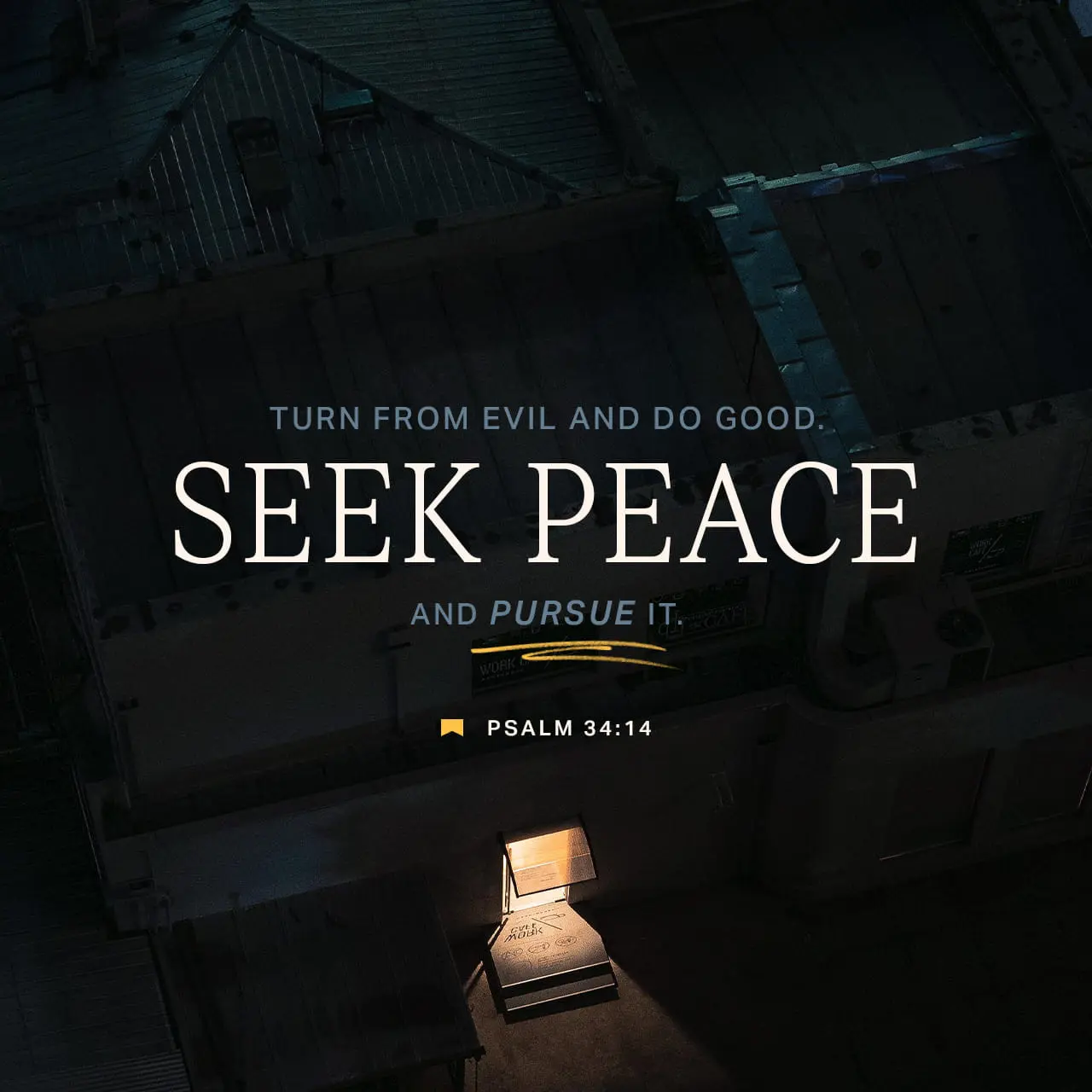
What drives peacemaking and the importance of getting out of our own way. Today is no different. If we say we want peace, do we mean on God’s terms or our own? There is a difference and the difference is reconciliation.
Do we want reconciliation for which we give God the glory? Or do we want triumph for which we pat ourselves on the back?
“Turn from evil and do good; Seek peace and pursue it.” — Psalm 34:14 (NASB)
“Embrace peace—don’t let it get away!” — Psalm 34:14 (The Message)
In a world where “peace” is often defined as convenience, comfort, or the absence of conflict, Psalm 34:14 calls us to a deeper pursuit, one that is intentional, active, and based on God’s terms, not our own. The NASB commands us to seek peace and pursue it, emphasizing that peace is something we must go after, not simply wait for. The Message makes it even more vivid: “Embrace peace, don’t let it get away!” Peace, then, is not something that just happens; it’s something we must hold onto with both hands, refusing to let it slip away because it is a limited time offer, in some ways.
What does it look like to hold on to peace? Imagine someone training for a marathon. Every morning, they wake up before dawn, push through exhaustion, and endure sore muscles. They don’t wait for endurance to magically appear, they actively build it. Peace works the same way. It requires practice, commitment, and sometimes pain. Which takes me to an excellent example of this. My favorite person in all of the Old Testament.
Joseph’s story in Genesis is a perfect example of training for a “pursuit” marathon. His brothers betrayed him, selling him into slavery out of jealousy. Years later, when those same brothers unknowingly stood before him in Egypt, desperate for food, Joseph had every reason to hold onto resentment. He could have let the opportunity for revenge define his future. Instead, he tested them; not for the sake of punishment or retribution but to see if true change had occurred in their hearts. When he saw their genuine concern and protection for Benjamin and their father, Israel, he embraced peace. So moved by the possibility he flat out ugly cried so loud the servants of Pharoah couldn’t help but hear from another part of the palace. The point, Joseph did not let it get away. Joseph understood that peace wasn’t about ignoring the past, it was about putting the past into proper perspective, based on present truth, in order to bring about transforming it into a new future.
Can we leave a legacy of peace, like Joseph? We often talk about what we pass down to the next generation; wealth, traditions, family stories. But what about peace? What grudges or divisions in our families and communities will continue if we do nothing to mend them? Let’s face it, there are very tough things that are all but impossible to make peace with because some involved don’t want peace. In those cases, we can only make peace within ourselves. But in the grander scheme of things, a lot of the ranker is not that deep. Not as deep as the divisions between Jacob and Esau or Joseph and his brothers. When Jesus taught about binding and loosing (Matthew 18:18), he reminded us that what we hold onto, or release, shapes the future. Joseph’s decision to forgive and reconcile changed the course of his family’s history. His story echoes the unresolved rivalry of Jacob and Esau, but instead of repeating the cycle of deception and division, he broke it. He no longer lived in the past in his head. Joseph was alive in his present with dreams for their shared future. Honestly, which is better?
John Wesley understood the weight of this kind of pursuit. In his commentary on Psalm 34:14, he noted that peace is not merely desired but must be actively followed. He saw it as a discipline of the Christian life; one that requires humility, repentance, and a willingness to seek the good of others, even when it is costly.
C.S. Lewis also recognized this challenge. In Mere Christianity, he wrote: “Everyone says forgiveness is a lovely idea, until they have something to forgive.” Yet, that is the moment we must decide; will we let peace slip away, or will we chase after it?
What are you holding onto today that keeps peace at a distance? Is there a conversation left unsaid, a grudge left unchallenged, a wound left unhealed? Seeking peace is not about forgetting the past but surrendering it to God and allowing Him to reshape the future.
Joseph’s story teaches us that pursuing peace requires real courage. Not a wimpy way at all! It means testing the waters, ensuring reconciliation is real, but ultimately choosing forgiveness over bitterness. Peace is a race worth running, a gift worth holding onto, and a legacy worth passing down.
Don’t let it get away.
Lord, help me to seek peace, not on my own terms, but Yours. Give me the strength to forgive, the wisdom to pursue reconciliation where I may, even when it can only be achieved in my own heart. Give me the courage to embrace peace even when it’s hard. May the legacy I leave behind be one of healing, not division.
In Jesus’ name, Amen.
